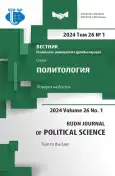The view on the Situation in Afghanistan in the Chinese Media within China’s National Security
- Authors: Dolokhova A.D.1, Soboleva E.D.1
-
Affiliations:
- HSE University
- Issue: Vol 26, No 1 (2024): Turn to the East
- Pages: 50-61
- Section: CHINA IN WORLD POLITICS: APPROACHES OF CHINESE AND RUSSIAN SCIENTISTS
- URL: https://journal-vniispk.ru/2313-1438/article/view/322445
- DOI: https://doi.org/10.22363/2313-1438-2024-26-1-50-61
- EDN: https://elibrary.ru/KNUVQX
- ID: 322445
Cite item
Full Text
Abstract
The withdrawal of US troops and the rapid takeover of Kabul by the Taliban (recognized as a terrorist organization and banned in the Russian Federation) in Afghanistan in 2021 shocked the world community. Even though the PRC actively opposes international terrorism, which the Taliban movement (recognized as a terrorist organization and banned in the Russian Federation) is accused of supporting, it has become one of the few countries that have begun to cooperate with the new Afghan regime. In the light of these events, China’s view of the situation in Afghanistan is puzzling, in particular, we are interested in how these events are reported in Chinese press. In this paper, first, we trace the evolution of the PRC’s official position on Afghanistan, and then, using frame analysis, analyze the coverage of the events of 2021 in the PRC by focusing on three authoritative newspapers, Chinese language versions of “People’s Daily”, “Global Times”, and “The Paper”. Our study demonstrates that the Chinese press supports China’s foreign policy in general and its policy in Afghanistan in particular. Stability in Afghanistan and cooperation with the Taliban (recognized as a terrorist organization and banned in the Russian Federation) on issues of Uighur separatism are important for China’s national security. In the Chinese media, the Taliban (recognized as a terrorist organization and banned in the Russian Federation) are not presented as accomplices of terrorism, which China is fighting within the framework of the Shanghai Cooperation Organization but are described as representatives of the Afghan people who aim to restore the security and stability in the country. When discussing the Taliban (recognized as a terrorist organization and banned in the Russian Federation) takeover in the Chinese media, the focus is often not on the crimes of the new regime - repression, abuse of power, restriction of rights, but on shortcoming of the US policy. The latter reflects an important discursive practice in the Chinese media, “othering” the United States.
About the authors
Anastasia D. Dolokhova
HSE University
Email: addolokhova@gmail.com
ORCID iD: 0000-0003-1233-6866
SPIN-code: 1193-9780
Student of the Oriental Studies program
St Petersburg, Russian FederationElena D. Soboleva
HSE University
Author for correspondence.
Email: edsoboleva@hse.ru
ORCID iD: 0000-0003-0525-2728
SPIN-code: 7451-9283
PhD in Political Science, Associate Professor, Department of International Relations and Political Processes in Asia and Africa, Institute of Oriental and African Studies
St Petersburg, Russian FederationReferences
- Bodrunova, S.S. (2019). Framing as a term in political communication studies: How a big idea grew and matured in the media effects theory. Journal of Political Research, 4, 127-141. (In Russian)
- Dolokhova, А.D., & Soboleva, E.D. (2022). Representation of the Black Lives Matter Movement in the CPC’s newspaper Global Times. Vestnik Moskovskogo universiteta. Seriya 10. Zhurnalistika, 2, 94-110. (In Russian). http://doi.org/10.30547/vestnik.journ.2.2022.94110
- Zamaraeva, N. A (2019). The PRC and Problems of Peaceful Settlement in Afghanistan. Far Eastern Studies, 3, 43-55. (In Russian). http://doi.org/10.31857/S013128120005264-1
- Carter, M.J. (2013). The hermeneutics of frames and framing: An examination of the media’s construction of reality. SAGE Open, 3(2)
- Chung, C. (2002). China’s “war on terror”: September 11 and Uighur separatism. Foreign Affairs, 81(4), 8-12
- Clarke, M. (2008). China’s “war on terror” in Xinjiang: Human security and the causes of violent Uighur separatism. Terrorism and Political Violence, 20(2), 271-301.
- Entman, R. (1993). Framing toward clarification of a fractured paradigm. Journal of Communication, 10, 155-173.
- Gabore, S.M. (2020). Western and Chinese media representation of Africa in COVID-19 news coverage. Asian Journal of Communication, 30(5), 299-316.
- Holbig, H. (2011). International dimensions of legitimacy: Reflections on Western theories and the Chinese experience. Journal of Chinese Political Science, 16, 161-181.
- Jureńczyk, Ł. (2022). China’s contribution to the stabilization of ‘democratic’ Afghanistan. Austral: Brazilian Journal of Strategy & International, Relations, 11(21), 77-100
- Kan, S. (2005). U.S.-China counter-terrorism cooperation: Issues for U.S. policy. CRS Report for Congress. Retrieved from https://irp.fas.org/crs/RS21995.pdf
- Repnikova, M., & Fang, K. (2019). Digital media experiments in China: “Revolutionizing” persuasion under Xi Jinping. The China Quarterly, 239, 679-701.
- Semetko, H.A., & Valkenburg, P.M. (2000). Framing European politics: A content analysis of press and television news. Journal of Communication, 50(2), 93-109.
- Zhao, Y. (2011). Understanding China’s media system in a world historical context. In D.C. Hallin & P. Mancini (Eds.), Comparing Media Systems beyond the Western World (pp. 143-174). Cambridge: Cambridge University Press
Supplementary files









